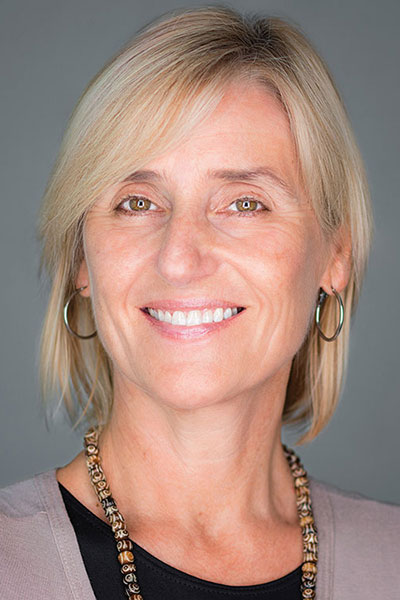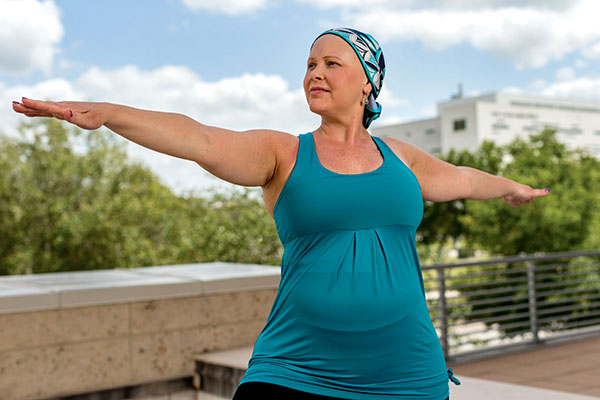Mind. Body. Cancer.
How Mind-Body Therapies Can Help You Heal
by Sharen Lock, MS, C-IAYT, E-RYT; Tammy Bernard, MEd, C-IAYT, E-RYT; and Lora Thompson, PhD
Not only has the popularity of mind-body techniques such as yoga and meditation exploded in recent years, but also a growing body of research suggests that cancer survivors who practice these techniques may have improved sleep, more energy, and less anxiety. Thus, many hospitals and medical centers throughout the country now offer yoga and meditation programs as part of an integrative approach to cancer care. So, if you’ve been thinking about trying a mind-body therapy to help you recover from cancer, there’s never been a better time than now.
Yoga
With its roots in Indian philosophy, yoga is best described as an ancient practice of self-care. The most familiar branch (or type) is hatha yoga, which is a system of physical exercises that often includes stretching, body postures, and breathing techniques. Within hatha yoga, some styles tend to be more athletic than others. However, the good news is that because of the potential health benefits of yoga for people with varying medical conditions, you can now find gentle classes targeting specific health needs or challenges. And, regardless of style, yoga is a great stress reduction practice for anyone. The movements and postures help stretch and tone your body, while the breathing techniques help focus and relax your mind.
“My yoga and meditation practice has had the single most positive impact on my quality of life during cancer treatment and is responsible for turning my outlook around after a difficult diagnosis. I used to see yoga as more of an athletic pursuit and thought that I simply couldn’t do it anymore due to my new limitations. But I have learned a deeper, more mindful way to practice that addresses my physical side effects together with the anxiety that goes along with battling cancer. I’m able to get the benefits of my favorite poses through small modifications tailored to my condition. My body and mind are going through so much right now, and my practice is a tangible thing I can do to honor and care for myself when so much else is uncertain.” – Robin Hesselink, cancer survivor, pictured above in warrior pose
Gentle yoga can be safely practiced by almost anyone at any time during their cancer experience, including during treatment. Yoga can be done on a mat, in a chair, or even in bed. Sometimes it’s best for cancer survivors to modify postures and use yoga props like soft blocks or folded blankets to provide added support. The key is to always honor your limits and make the practice about what is possible for you – and your body – today.
Meditation
Meditation is another self-care practice that anyone can safely do. Among the many styles, the most common involves focusing attention on an object, such as the breath; on a word or phrase; or on what is happening moment-to-moment with your mind, body, and senses. Meditation can help you feel calmer. It can be done as a stand-alone activity or as part of a yoga practice.
Mindfulness
An increasingly popular mind-body practice, and form of meditation, is mindfulness. Mindfulness was first introduced by Jon Kabat-Zinn in the United States in the mid-70s as a method for reducing stress. Simply stated, mindfulness means paying attention to what’s happening in the present moment with openness and curiosity.
Regardless of style, yoga is a great stress reduction practice for anyone.
Take 5
Health Benefits of Practicing Yoga
1. Better sleep
2. Reduced fatigue
3. Increased flexibility
4. Improved mood and well-being
5. Better overall fitness and strength
For example, have you ever driven somewhere on autopilot and then not remembered how you got there? It may have been because you were lost in thought and just didn’t notice what was going on around you. If you were practicing mindfulness, you would be more aware of your surroundings, your thoughts, and the things you would see and hear as you drove to your destination. Whether you are sitting and meditating or performing rote daily activities, mindfulness can take you out of thinking and worrying about the future and allow you to appreciate your life as it is now.
Mindfulness can even help you in your yoga practice. When you bring a mindfulness approach to the practice of yoga, you begin to let go of expectations and judgments of what you think a posture should look like or feel like. Instead, you learn to care for yourself with kindness, accepting what is possible for you today. The process of your practice becomes more important than striving for the perfect yoga pose.
Joining a Group
Although yoga and meditation can be practiced alone, there are benefits to joining a group practice. Practicing in a group allows you to connect with others in a supportive and welcoming environment. Coming together in this way to focus on what is right in your life rather than what is wrong can be deeply nourishing and empowering.
Look for yoga, meditation, and mindfulness programs at your local cancer or wellness center. You can also download meditation and mindfulness apps to your smartphone or tablet. For yoga, find a certified yoga instructor or yoga therapist who is trained in working with people experiencing cancer or other health conditions. And, most important, check with your healthcare provider before you begin a new mind-body practice during or after cancer treatment.

Sharen Lock (left) is a certified yoga therapist and patient wellness coordinator with the Integrative Medicine Service at the H. Lee Moffitt Cancer Center & Research Institute in Tampa, FL.

Tammy Bernard (right) is a certified yoga therapist and integrative therapies practitioner at the University of Florida Health Shands Hospital’s Arts in Medicine Integrative Therapies Program in Gainesville, FL. Together, Sharen and Tammy have developed a professional training for yoga instructors, Mindfulness Yoga and Meditation for Cancer Care: Empowering Others with Inner Resources for Healing.

Dr. Lora Thompson (left below) is a licensed psychologist and director of the Integrative Medicine Service at Moffitt Cancer Center.
Visit moffitt.org/yoga to find a selection of guided videos demonstrating gentle yoga for cancer survivors.
This article was published in Coping® with Cancer magazine, July/August 2018.


